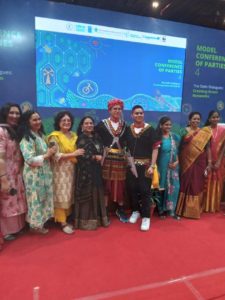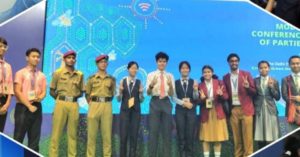By Esha Chaudhuri
 At a time when the state has not been in the news for the best reasons – dismal state of the educational system and infrastructure or even NITI Aayog’s most recent report on Meghalaya’s ranking as the second poorest state in the country, two young and aspirational teenagers Sean Daniel Kharkongor Rymbai (17) and Armaan Tandon (17) from Army Public School, Shillong represented the state and their ideas at the ‘Model Conference of Parties 4; Delhi Dialogues: Creating Green Networks’ in New Delhi from July 3-5, 2023. The three day programme laid emphasis on the motto ‘Nature Protects, if Protected’. The role of the youth was the idea on which the event was hinged, where the young show the mirror to the ‘experts’ through engagement followed by action since the challenges that the younger generation face are manifold.
At a time when the state has not been in the news for the best reasons – dismal state of the educational system and infrastructure or even NITI Aayog’s most recent report on Meghalaya’s ranking as the second poorest state in the country, two young and aspirational teenagers Sean Daniel Kharkongor Rymbai (17) and Armaan Tandon (17) from Army Public School, Shillong represented the state and their ideas at the ‘Model Conference of Parties 4; Delhi Dialogues: Creating Green Networks’ in New Delhi from July 3-5, 2023. The three day programme laid emphasis on the motto ‘Nature Protects, if Protected’. The role of the youth was the idea on which the event was hinged, where the young show the mirror to the ‘experts’ through engagement followed by action since the challenges that the younger generation face are manifold.The event
The Delhi Dialogues is a platform organised by the United Nations Environment Programme (UNEP), WorldWide Fund for Nature (WWF) which is a youth forum for young school goers to attend, partake and put forth their thoughts on green initiatives. Various schools from different parts of the country were sent invitations after which all contenders had to sit through a competitive screening for selections. Representatives from different states presented environmental concerns that dwell in their states. For instance, Jharkhand, West Bengal and Odisha presented issues on wetlands, pollution in water bodies, species affected and decisive plans of action to combat them. The event also showcased cultural presentations of dances, music and poetry recitation.
Tandon and Rymbai were the two contenders on behalf of Meghalaya who presented the major attractions in the state of Meghalaya – its natural and scenic spots, and recited poems on the treasure that nature is. Sharing his experience at the event, Rymbai says, “I had a phenomenal time at the conference. Interacting with diverse people who excelled and appeared to be a combination of both brain and heart was truly a highly enriching experience. Right from the WWF organising committee to the delegates, each person brought a unique and insightful perspective to the conference.”

Tandon who draws inspiration from Thomas Jefferson’s quote “To achieve something you’ve never had, you must do something that you’ve never done”, added, “My experience was filled to the brim with learning and getting in touch with my environment, my surroundings and everything that’s near and dear to my ecosystem. The experience was enchanting and thrilling at every level, accompanied by a greater drive and purpose – to save the planet that bears my brunt.”
From an educational point of view, when asked about some of the new concepts and learnings from the conference, Rymbai says, “The importance of the idea of ‘unity in diversity’ was impressed upon me.” Citing an example, he explains,”If we were to consider India being a fruit basket, it is one of the most diverse countries in the world, environmentally as well as socially. Dozens of delegates attended the conference belonging from different backgrounds, communities and creeds but we all had one thing in common – we were all Indians.”
From an educational point of view, In Tandon’s words, “From a plethora of new ideas, if I were to choose the best out of all, Policy Making, Consensus Building, Negotiating and international treaties on Biodiversity is what I’ve learnt most about.”
Takeaways
The forum showcases India’s youth and school goers, their concern towards shifting climatic conditions, its impact on human lives and the possibility of a people’s movement. As the platform was educative and harped on change from both individualistic and community levels, it left the two impressionable minds from Meghalaya moved too.

“The conference has left a heavy mark on my heart as it has made me realise my responsibilities as a citizen of my dear planet. I am much more inclined and affectionate to my society, than I ever was as most often we fail to recognise the beauty of the world around us.” says Tandon.
Tandon further adds, “This learning will help me as a young individual to encourage the budding minds of my friends and juniors to sensitise with what is ours – our very planet. Dust I am and to dust I shall return, yet If I can make even a small change, a small difference in the world around me, then I will live by it.”
Tandon further expands, “This conference made a deep impact on me as it made me aware about several social problems we are facing as a people and how we continue to choose to ignore on a daily basis and turn a blind spot. All these problems can be ticking time bombs that may explode if we don’t resolve to do something fast collectively towards finding immediate solutions – especially climate change. For example, we are experiencing hot and humid days in Shillong which we never experienced in the past.”
Rymbai further adds, “An important task that I’ve been given by WWF, is to seek ways and means to increase the overall participation of women in Biodiversity Management Committees (BMCs) in Meghalaya by January 2024. I hope to start a process of sensitising in my school and peers in the near future , as I firmly believe that women and men are like two wings of a bird, and only if both wings flap can a bird fly and soar.”
Enthused youths
Learning beyond the classroom, interacting with fellow mates from various states and hearing their perspectives, has left an indelible mark on both Rymbai and Tandon. Rymbai, who is also fond of orations and debates, social work, playing basketball and boxing, wants to serve the people of his state to the best of his abilities. According to him, the biggest challenge today with regard to the environment and its sustainability in the state is not the mega factories that produce tons of smoke on a daily basis, nor is it the plastic that’s choking our oceans of life, it is the ‘mindset’ of the people.
As a corrective measure, Rymbai suggests collaborating with organisations that possess the bandwidth to tackle it. He says “We as youth can take several initiatives, such as working for organisations such as the WWF and UNEP on the weekends to protect and preserve our precious environment and eco systems.The earth does not ask for much, but a mere shot at survival, and just taking a couple of hours off on the weekends to achieve this goal will go a long way in fixing many of the problems.”

According to Tandon, whose interests and hobbies are centred around public speaking, poetry, debating, Astrophysics, and Literature believes that there is no home other than earth and without its nourishment, there is no thriving for humans. Tandon says, “The environment is my homeland, the ecosystem is, and I will not let anybody snap my planet away from me. Our environment isn’t just an 11 letter word, rather, the basis of the world, as without our air and water and soil, we are meagre nothings.”
Sharing similar views like Rymbai, Tandon also emphasises on youth movements for the environment. Rymbai says, “The youth plays a primary role in the conservation of the environment as this is just not for their generation, but all their lineage that is yet to follow. This isn’t a burden on your shoulders, rather a pat on it that you are sustaining God’s Blueprint.”
Speaking about his future endeavours in relation to the environment, and mobilising the youth, Rymbai shares, “We will firstly complete the task given to us by WWF which is ‘increasing the total number of women participation in BMC organisations.’ Apart from that, I also wish to work for the betterment of Meghalaya and its people.”
 A firm believer in change and decisive action, Tandon says, “We often live our lives in selfish ways and means, failing to realise that one man’s garbage might be another man’s treasure. We simply fail to understand that the world we will leave behind today might not be inhabitable tomorrow. Keep working and striving towards the world you want to see. Live by deeds, not words. After all, the pen that writes your story must be held in your hands.”
A firm believer in change and decisive action, Tandon says, “We often live our lives in selfish ways and means, failing to realise that one man’s garbage might be another man’s treasure. We simply fail to understand that the world we will leave behind today might not be inhabitable tomorrow. Keep working and striving towards the world you want to see. Live by deeds, not words. After all, the pen that writes your story must be held in your hands.”Such forums break the ice and bring people together. They help overcome perceived senses of barriers, as well as cultivate expansive ideas for those with preconceived notions about the Northeast.
Donning the traditional Khasi attire, and competing against 72 other delegates from across the country, Rymbai and Tandon draw our attention to the ever changing climatic conditions, its impact on human lives and the need for concerted efforts to reverse it.



